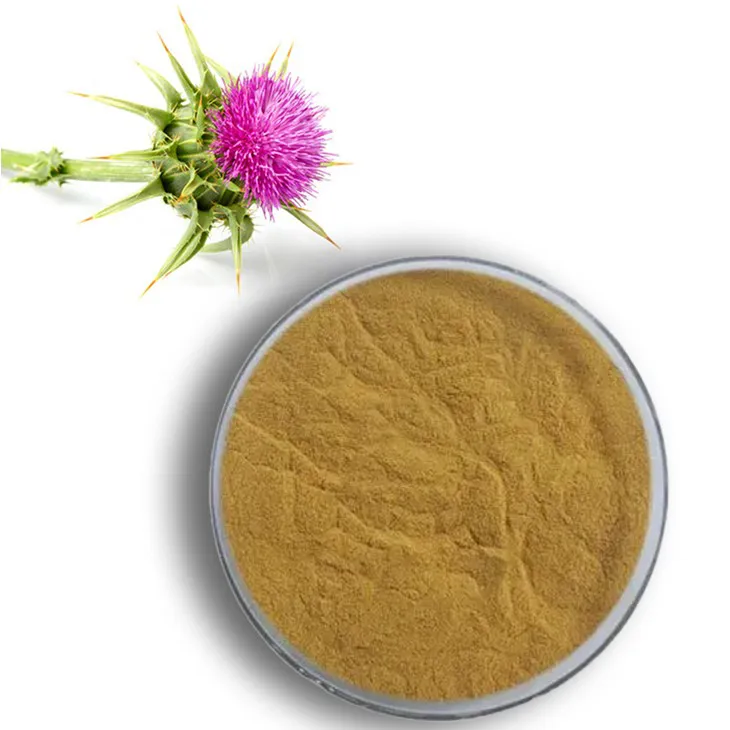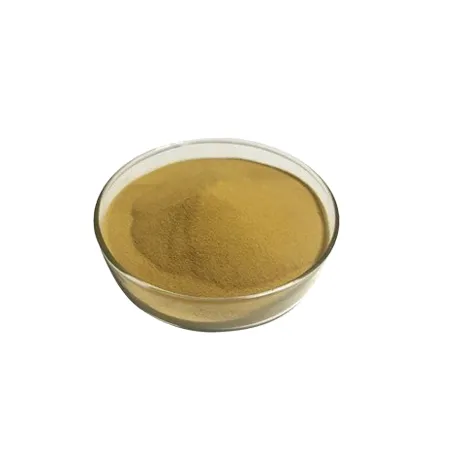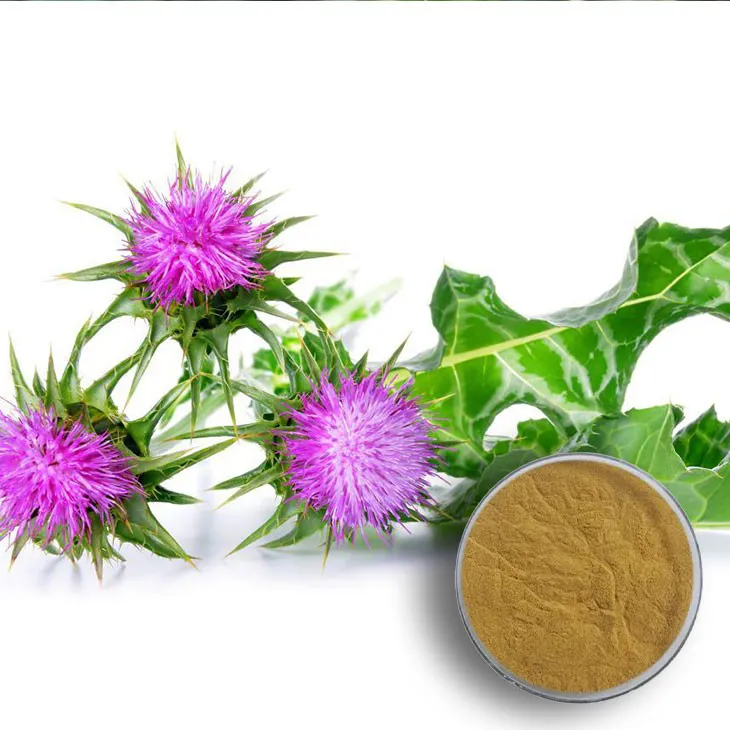- 0086-571-85302990
- sales@greenskybio.com
Milk Thistle Extract: Should You Use It for Skin Care?
2024-11-14

1. Introduction
Skincare has become an increasingly important aspect of our daily routines, with consumers constantly on the lookout for natural and effective ingredients. One such ingredient that has been garnering attention is Milk Thistle Extract. But before incorporating it into our skincare regimens, it's crucial to understand what it is, its potential benefits, and any associated risks.

2. What is Milk Thistle Extract?
Milk thistle, scientifically known as Silybum marianum, is a plant native to the Mediterranean region. The extract of milk thistle has been used for centuries in traditional medicine for various health purposes. It contains a group of flavonolignans, with silymarin being the most well - known and studied component. Silymarin is a powerful antioxidant and is believed to be responsible for many of the potential benefits of Milk Thistle Extract in skincare.

3. Antioxidant Powers
3.1. How it Works
Antioxidants play a vital role in skincare as they help to combat free radicals. Free radicals are unstable molecules that can damage skin cells, leading to premature aging, wrinkles, and dull skin. Milk thistle extract, particularly silymarin, works by donating electrons to these free radicals, thereby neutralizing them. This process helps to protect the skin from oxidative stress, which is caused by a combination of environmental factors such as pollution, UV radiation, and cigarette smoke.
3.2. Comparison with Other Antioxidants
When compared to other common antioxidants in skincare, such as vitamin C and vitamin E, milk thistle extract has its own unique properties. While vitamin C is known for its brightening effect on the skin and vitamin E is a lipid - soluble antioxidant that protects cell membranes, milk thistle extract's antioxidant action is more comprehensive. It can target different types of free radicals and has been shown in some studies to have a synergistic effect when combined with other antioxidants, enhancing their overall efficacy.

4. Anti - Inflammatory Properties
4.1. Reducing Skin Inflammation
Inflammation is another key factor in skin health. Skin conditions such as acne, eczema, and psoriasis are often associated with chronic inflammation. Milk thistle extract has anti - inflammatory properties that can help to soothe irritated skin. It works by inhibiting certain enzymes and cytokines that are involved in the inflammatory response. This can lead to a reduction in redness, swelling, and discomfort associated with inflamed skin conditions.
4.2. Calming Sensitive Skin
For those with sensitive skin, milk thistle extract can be a valuable addition to their skincare routine. Sensitive skin is more prone to reacting to environmental stimuli and skincare products, often resulting in redness, itching, or stinging. The anti - inflammatory properties of milk thistle extract can help to strengthen the skin's barrier function, making it less reactive and more resilient. By calming the skin, it can also improve the overall appearance of sensitive skin, giving it a more even - toned and healthy look.
5. Real - Life Case Studies
5.1. Acne Treatment
There have been several case studies on the use of milk thistle extract in the treatment of acne. In one study, participants with mild to moderate acne were given a topical formulation containing milk thistle extract. After a period of several weeks, a significant reduction in the number of acne lesions was observed. The anti - inflammatory properties of the extract were thought to play a major role in reducing the redness and swelling associated with acne, while its antioxidant properties may have helped to prevent further damage to the skin caused by the bacteria involved in acne formation.
5.2. Anti - Aging Effects
Some individuals have also reported positive results in terms of anti - aging when using products containing milk thistle extract. For example, a small group of volunteers used a serum with milk thistle extract as part of their daily skincare routine for a few months. They noticed a reduction in the appearance of fine lines and wrinkles, as well as an improvement in skin texture. While these case studies are not conclusive evidence on their own, they do suggest that milk thistle extract may have potential in the area of anti - aging skincare.
6. Expert Opinions
Many skincare experts are also showing an increasing interest in milk thistle extract. Dermatologists often point out that while more research is needed, the initial findings on its antioxidant and anti - inflammatory properties are promising. They recommend that it can be considered as part of a comprehensive skincare approach, especially for those with specific skin concerns such as acne - prone or sensitive skin. However, they also caution that like any new ingredient in skincare, it should be introduced gradually to monitor for any potential adverse reactions.
7. Efficacy in Skincare Routines
7.1. Incorporating into Cleansers
Cleansers are an essential part of any skincare routine. Adding milk thistle extract to cleansers can provide an extra layer of protection during the cleansing process. The antioxidant properties of the extract can help to neutralize free radicals that may be present on the skin surface, while its anti - inflammatory properties can soothe the skin, especially if the cleanser contains potentially irritating ingredients. For example, a milk thistle - infused cleanser may be beneficial for those with combination skin, as it can help to balance the skin's oil production and reduce inflammation in the pores.
7.2. Serums and Moisturizers
Serums and moisturizers are designed to deliver concentrated active ingredients to the skin. Milk thistle extract can be a valuable addition to these products. In serums, it can enhance the antioxidant protection of the skin, working in tandem with other active ingredients such as hyaluronic acid to provide both protection and hydration. In moisturizers, it can help to soothe and protect the skin, making it suitable for all skin types. For dry skin, it can assist in reducing inflammation and improving the skin's barrier function, while for oily skin, its antioxidant properties can help to prevent oxidative damage that can lead to excess oil production.
8. Safety Considerations
8.1. Allergic Reactions
Although milk thistle extract is generally considered safe for topical use, there is a small risk of allergic reactions. Some individuals may be allergic to plants in the Asteraceae family, to which milk thistle belongs. Symptoms of an allergic reaction may include redness, itching, and swelling at the application site. It is recommended that a patch test be done before using a product containing milk thistle extract for the first time. This involves applying a small amount of the product to a small area of skin, such as the inner forearm, and waiting for 24 - 48 hours to see if any reaction occurs.
8.2. Interaction with Other Ingredients
When using products containing milk thistle extract, it's also important to consider its interaction with other ingredients. While there are no known major negative interactions at present, it's still advisable to check with a skincare professional if using it in combination with strong medications or other active skincare ingredients. For example, if using a product with retinol, which is a well - known anti - aging ingredient, it's important to ensure that the addition of milk thistle extract does not cause any adverse effects on the skin.
9. Conclusion
In conclusion, milk thistle extract shows great potential in skincare. Its antioxidant and anti - inflammatory properties make it a promising ingredient for various skin concerns, including acne, anti - aging, and sensitive skin. Real - life case studies and expert opinions also support its possible efficacy. However, safety considerations such as the potential for allergic reactions and interactions with other ingredients should not be overlooked. Overall, it can be a valuable addition to a skincare routine, but as with any new ingredient, it should be used with caution and proper testing.
FAQ:
What are the antioxidant properties of milk thistle extract in skincare?
Milk thistle extract contains silymarin, which is known for its antioxidant capabilities. Antioxidants in the extract can help combat free radicals in the skin. Free radicals are unstable molecules that can damage skin cells, leading to premature aging, wrinkles, and dull skin. By neutralizing these free radicals, milk thistle extract may contribute to maintaining the skin's health and youthful appearance.
How does milk thistle extract show anti - inflammatory effects on the skin?
The anti - inflammatory properties of milk thistle extract can be beneficial for various skin conditions. It may help reduce redness, swelling, and irritation. Inflammatory responses in the skin can be triggered by factors like environmental pollutants, allergens, or skin disorders. The active compounds in milk thistle extract work by modulating the body's inflammatory pathways, thus potentially alleviating skin inflammation.
Are there any real - life case studies showing the effectiveness of milk thistle extract in skincare?
There have been some real - life case studies indicating positive results. For example, in some small - scale studies on individuals with mild skin inflammation, the use of products containing milk thistle extract showed a reduction in redness and itching over a certain period. However, more extensive and large - scale studies are still needed for conclusive evidence. But these initial case studies do suggest potential benefits in skincare.
What do experts say about the safety of using milk thistle extract in skincare?
Most experts consider milk thistle extract to be generally safe for use in skincare when used as directed. However, some individuals may be allergic to it, so a patch test is often recommended before full - scale use. Also, the concentration of the extract in skincare products should be within a safe range. Experts suggest that while it has shown potential benefits, proper formulation and quality control are essential to ensure its safety in skincare applications.
How can one incorporate milk thistle extract into their skincare routine?
Milk thistle extract can be found in various skincare products such as creams, serums, and masks. If using a product containing this extract, it is typically applied as per the product's instructions. For example, a serum may be applied after cleansing and toning, followed by a moisturizer. However, it's important to start with a product with a lower concentration if you have sensitive skin and gradually increase usage to monitor the skin's response.
Related literature
- The Role of Antioxidants in Skincare: A Focus on Milk Thistle Extract"
- "Anti - Inflammatory Agents in Natural Extracts for Skin Health: Milk Thistle as a Case Study"
- "Milk Thistle Extract in Cosmetics: Efficacy and Safety Considerations"
- ▶ Hesperidin
- ▶ citrus bioflavonoids
- ▶ plant extract
- ▶ lycopene
- ▶ Diosmin
- ▶ Grape seed extract
- ▶ Sea buckthorn Juice Powder
- ▶ Beetroot powder
- ▶ Hops Extract
- ▶ Artichoke Extract
- ▶ Reishi mushroom extract
- ▶ Astaxanthin
- ▶ Green Tea Extract
- ▶ Curcumin Extract
- ▶ Horse Chestnut Extract
- ▶ Other Problems
- ▶ Boswellia Serrata Extract
- ▶ Resveratrol Extract
- ▶ Marigold Extract
- ▶ Grape Leaf Extract
- ▶ blog3
- ▶ blog4
- ▶ blog5
-
Organic Tongkat Ali extract powder factory.
2024-11-14
-
How to make powder with ashwagandha extract.
2024-11-14
-
Rosehip extract manufacturers from China.
2024-11-14
-
The best cat's claw extract in nature.
2024-11-14
-
Chinese Dandelion Leaf Extract Suppliers.
2024-11-14
-
Maca Extract
2024-11-14
-
Stevia Extract
2024-11-14
-
Kupilu Extract
2024-11-14
-
Angelica sinensis extract
2024-11-14
-
Cassia Seed Extract
2024-11-14
-
Genistein
2024-11-14
-
melatonin extract
2024-11-14
-
Shikone Extract
2024-11-14
-
Konjac Powder
2024-11-14
-
Hops Extract
2024-11-14





















